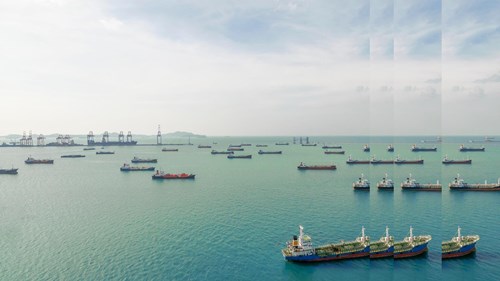EU sets minimum standards for criminal prosecution of sanction violations
With Directive (EU) 2024/1226 on the definition of criminal offences and penalties for the violation of Union restrictive measures (Directive 2024/1226), which came into force on 19 May 2024, the EU sets new standards for prosecuting and punishing violations of those measures (sanctions).
The EU’s powers in the area of criminal law are limited in principle to certain areas of especially serious cross-border crime such as terrorism, money laundering and corruption. However, the Council can decide to add further areas to the list of EU criminal offences. Such a decision was taken in November 2022 for offences against EU sanctions.
The Directive now enacted defines a set of actions that must be punished by the Member States as violations in future while also setting minimum standards for criminal penalties. The EU thus aims to increase the effectiveness of its sanctions. To date, the criminal prosecution of sanctions violations has varied from Member State to Member State.
Criminal liability for sanctions violations
Article 3(1) of Directive 2024/1226 lists conduct which must be treated by the Member States as a criminal offence where it is intentional and in violation of a prohibition or an obligation that constitutes a Union restrictive measure.
This conduct includes violations of the prohibition on making funds or economic resources available (Article 3(1)(a) and (b) of Directive 2024/1226), enabling designated natural persons to enter into, or transit through, the territory of a Member State (c); entering into or continuing prohibited transactions (d); providing prohibited financial services or other prohibited services (g); trading in designated goods, as well as providing brokering services, technical assistance or other services relating to those goods (e).
It should be emphasised that violations of goods-related sanctions under Article 3(1)(e) and (3) of Directive 2024/1226 are to be prosecuted as criminal offences even if they are committed with gross negligence or, in the terminology of criminal law, recklessly, provided they relate to military items or dual-use goods.
In addition, certain ways of circumventing sanctions in connection with the freezing requirement – for example, concealing the fact that certain funds are subject to the freezing requirement or failing to report frozen funds – are to be prosecuted as criminal offences by the Member States in future (Article 3(1)(h) of Directive 2024/1226).
Inciting, aiding and abetting, and attempting to commit a punishable sanction violation also have to be treated as a criminal offence by the Member States under Article 4 of Directive 2024/1226.
Guidelines on criminal penalties
The Directive also contains guidelines on criminal penalties. According to Articles 5 and 7 of Directive 2024/1126, Member States must punish criminal offences with effective, proportionate and dissuasive sanctions.
Depending on the offence, it should be possible to impose a maximum custodial sentence of no less than one, three or five years for offences committed by natural persons if the offences involve funds or economic resources worth at least €100,000. This threshold can also be reached by a series of related offences of the same type.
If the offence relates to military items or dual-use goods, the penalty is a maximum sentence of at least five years’ imprisonment, regardless of the value of the goods concerned.
In addition to custodial sentences, it will also be possible to impose accompanying criminal and non-criminal measures. These include fines, the withdrawal of licences and permits, a ban on holding management positions or a temporary ban on running for public office. In this respect it is notable that in sufficiently justified exceptional cases where there is a public interest, court decisions on a criminal offence may also be published, including the personal data of convicted persons contained therein.
It must also be possible to impose effective, proportionate and dissuasive criminal or non-criminal sanctions or measures on legal persons who can be held liable for a criminal offence. These primarily include financial penalties or fines. Regarding the size of the penalties, the Directive stipulates that, as a rule, this must be at least either 5% of total worldwide turnover or €40 million.
In addition, Article 7(1) of Directive 2024/1126 provides examples of other measures that can be imposed on legal persons, such as exclusion from public funds, a ban on exercising its profession, judicial supervision, the closure of organisations, or a court-ordered dissolution.
The liability of legal persons for sanctions violations is linked to the conduct of persons in a leading position (Article 6(1) Directive 2024/1126). The prerequisite is that an offence was committed for the benefit of a legal person by a person who holds a leading position within that legal person. Other prerequisites are that the legal person must have had a power of representation of the legal person and an authority to take decisions on behalf of the legal person or an authority to exercise control within the legal person.
Companies can also be held liable for a criminal offence committed by ordinary employees if this was made possible by a lack of supervision or control by a person in a managerial position.
Implementation in Germany
Section 18 of the German Foreign Trade and Payments Act already criminalises numerous sanctions violations. However, there is still a need for German legislators to take action.
In particular, reckless violations of goods-related sanctions must be prosecuted under criminal law in future if they relate to military items or dual-use goods. Section 19(1) of the German Foreign Trade and Payments Act currently only considers this to be an administrative offence.
In addition, circumvention of sanctions is now also prosecuted under criminal law again in some cases. Such criminal liability was previously already provided for in section 34(4)(2) of the previous version of the German Foreign Trade and Payments Act, the compatibility of which with the constitutional requirement of legal certainty was questioned by Germany’s Federal Court of Justice. By introducing the Foreign Trade and Payments Law Modernisation Act in 2013, the legislator then abolished the criminal liability of sanction circumvention. Now sanction circumvention with regard to the freezing requirement has been made punishable again.
Finally, the size of fines that can be imposed on a company under the German Administrative Offences Act must also be adjusted. Currently, the maximum amount is €10 million in accordance with section 30(2)(1) of the Act. When adapting this, the legislators have the choice of either tying the fine to the total worldwide turnover or stipulating a minimum fine of €40 million.
Outlook
The German legislator has to implement the Directive by 20 May 2025. There will certainly still be arguments about some of the requirements.
Due to the link with sanctions law, Germany’s Federal Ministry of Economics and Climate Protection is in charge of the amendment to the German Foreign Trade and Payments Act currently in progress. For now, the Ministry does not aim to implement any provisions beyond the minimum requirements of the Directive.
Nevertheless, it is likely that we will see an increase in criminal prosecutions. Sanctions compliance will therefore continue to play an ever-increasing role.
Well
informed
Subscribe to our newsletter now to stay up to date on the latest developments.
Subscribe now









